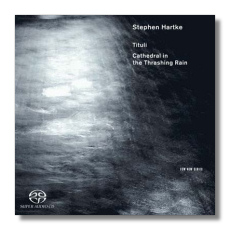
The Internet's Premier Classical Music Source
Related Links
- Latest Reviews
- More Reviews
-
By Composer
-
Collections
DVD & Blu-ray
Books
Concert Reviews
Articles/Interviews
Software
Audio
Search Amazon
Recommended Links
Site News
 SACD Review
SACD Review
Stephen Hartke

- Tituli
- Cathedral in the Thrashing Rain
Michelle Makarski, violin
Lynn Vartan, Javier Diaz, percussion
The Hilliard Ensemble/Donald Crockett
ECM New Series 1861 Hybrid SACD 60:28
New Jersey-born composer Stephen Hartke teaches at the University of Southern California, where these two works received their U.S. première in January 2001. It had long been Hartke's ambition to write for The Hilliard Ensemble, and in 1999 he did so with Tituli, and again one year later with Cathedral in the Thrashing Rain.
Like many modern American composers, Hartke's style is fluid and changeable, depending on what inspires him, and on the needs of his performers. One of his early loves, however, was polyphony from the Medieval and Renaissance eras, and that love is made manifest in these two works.
Tituli, scored for the Hilliards, violinist Makarski, and two percussionists, is a setting of ancient Etruscan and Latin texts. Sometimes, as in the first movement, the texts are fragmentary, and their significance is not always clear. "Elogium parvuli" (Epitaph for a small boy), on the other hand, is easily recognized as an elegy for an untimely departed six-year-old named Optatus. Hartke sets these texts like the most affectionate of archeologists; he has been successful in hearing the old and enduring music in them, rather than corrupting them with pastiche or some other century's musical and emotional biases. The composer's love for early polyphony has assisted in him weaving together the vocal parts, but the finished work is an unmistakable testimony to Hartke's faith in the timelessness of the texts. There are no easy effects in Tituli, just a serious search for the most direct means of expression.
Impressed with Tituli, the Hilliards asked Hartke for an a cappella work for four voices, and Cathedral in the Thrashing Rain was the result. The original text is by Japanese poet Takamura Kotaru, who was deeply moved by a visit to Paris and the Cathedral of Notre-Dame. (Hartke set the text in an English translation by Hiroaki Sato.) Again, Hartke's love for polyphony is literally what made it possible for him to write this work, yet his response to the text is notable for its originality and open-mindedness. Like the speaker in Cathedral, both works suggest that Hartke is someone who venerates the ancient with sentimentalizing or trivializing it.
Hartke demands and receives great virtuosity from the performers. The inherent difficulties of Medieval polyphony are quadrupled, at least, by Hartke's writing. Recorded in the presence of the composer, these performances are definitive.
This is the first ECM New Series disc to be released in the SACD format, and it remains compatible with standard CD players. The venue was Mechanics Hall in Worcester, Massachusetts, and the engineers have given the music both intimacy and air.
Copyright © 2004, Raymond Tuttle


















